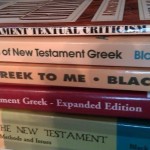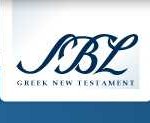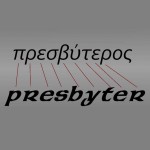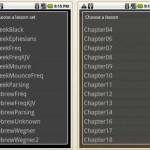Books for Studying NT Greek Addendum
Dave Black wrote a new essay called “Ten Best Books for Studying New Testament Greek.” His list is great! But, because of his humility, his list is missing some of the best books for studying New Testament Greek.
First, if you are studying NT Greek, you should definitely have Black’s grammar Learn to Read New Testament Greek. Black uses a morphological approach that makes the language easier to learn and understand.
Also, you should pick up a copy of Black’s short (but extremely helpful) book It’s Still Greek to Me. This is an intermediate grammar that digs deeper into the nuances of nouns, verbs, prepositions, pronouns, etc. in a manner that is still easy to understand and fun to read.
Black’s other introductory books are also very helpful. For example, get Using New Testament Greek in Ministry for help in exegesis and teaching, New Testament Textual Criticism: A Concise Guide for an introduction to the often complex subject of textual criticism, and Linguistics for Students of New Testament Greek for an introduction to the field of linguistics and discourse analysis.
For an even more detailed analysis of some of these same subjects, read Black’s (as editor) Linguistics for Students of New Testament Greek and Interpreting the New Testament.
So, there you have it. Add this books to Dave Black’s ten, and you’ve got a great library for studying New Testament Greek.
SBLGNT now availble for download
The new critical edition of the Greek New Testament (put together by SBL and Logos Bible Software) is now available for download. The new edition is called SBLGNT.
The text is currently available to download for Logos, in pdf format (oops… pdf is not available yet), in XML format, and in plain text. It looks like SBLGNT will soon be available at Biblia.com and as an iPhone app. (What about Android?)
I haven’t had time to look at it yet, but I hope to compare it to the NA/UBS text soon.
(HT: David)
SBL Greek New Testament
The Society of Biblical Literature and Logos Bible Software are working together to create a new critical edition of the Greek New Testament. Apparently, it is going to be called the “SBL Greek New Testament” or SBLGNT. (HT: Evangelical Textual Criticism)
According to the website, the new edition is being edited by Michael Holmes, will be different from the Nestle-Aland (NA/UBS) text, and will be available for free download.
Furthermore, SBL will produce a print version of this new edition of the Greek New Testament.
I haven’t seen any information about the text itself. Hopefully, there will be some good reviews and comparisons coming out soon.
Greek Study Club Update
A couple of months ago, several of us began meeting on Tuesday evenings (from 6-7 p.m.) to study Greek. From time to time, someone asks me how the study club is going, so I thought I would give an update here.
Three people started meeting with us who had never studied Greek before. Four other people joined us who had already studied Greek. The new learners began by working their way through Learn to Read New Testament Greek by David Alan Black. Meanwhile, those who had already studied Greek agreed to being translating 2 John.
The beginners are slowly going through their beginning grammar, taking their time so that they understand the material. And those who already know Greek? While we’ve talked about 2 John, we’ve primarily enjoyed helping the new learners.
For example, last night, three of us took turns teaching the beginners how to parse verbs and translate simple sentences. It has been great fun teaching and learning together.
If you are interested in joining us, you can. Anyone can start at any time.
Transliterations and Translations
Last week, in our Greek Study Club, someone said something like this: “I was surprised when I found out that the Greek term for ‘gospel’ (εá½Î±Î³Î³Îλιον – euangelion) simply means ‘good news.’ I always thought it was a special word with religious connotations.”
And, it’s true. The word simply means “good news.” When a herald or representative of the government came into town with a decree from Caesar, he brought “good news” (Old English “gospel”, Greek εá½Î±Î³Î³Îλιον – euangelion).
There are several words like “gospel” which are transliterated or carried over from an older language. For example, “gospel” comes from the Old English “gÅd spell” which meant, simply, “good news.”
Something seems to happen, though, when we run across one of these words. We assume that the word itself must have some type of religious or theological or spiritual significance. In fact, most of these words are simple, everyday Greek (or Latin, or Old English, or German) words.
Here are some of the words that I’m talking about: gospel, apostle, presbyter, church, baptize, pastor, ministry (minister), deacon, and angel. (A transliteration, by the way, is a mapping of characters or sounds from one language into a new language which then creates a new word.)
I think that including transliterations like these in our translations actually leads to more confusion and misunderstanding than translating the words. So, why not use “good news,” “envoy/ambassador,” “older man,” “assembly,” “immerse,” “shepherd,” “service” (“servant”), “servant,” and “messenger”? Well, that’s a good question (I think). I know part of the reason – at least the part that included the translators of the KJV in 1611. But, I don’t know why modern translators continue to use transliterations.
I suppose the transliterations are simple and accepted. But, like I said before, I think they can also lead to confusion and the propagation of traditional meanings that are not actually part of the verbal meanings.
So, what do we do? I guess, for now, we have to explain what each words means as we come across it in our English translations of the New Testament. Each time we see the word “church,” for example, we have to explain that it cannot mean building, or organization, or clergy, or anything like that. Instead, it simply means an assembled group of people.
What do you think? Should translators keep using transliterations? What about words like “amen,” “Christ,” and “Messiah?” Can they be transliterated, or should we translate them as well? Can you think of other transliterations (from Greek, Latin, German, Old English, etc.) that may mislead the reader?
Bible Flashcards for Android
If you have an Android phone, there is a great (free) app called Bible Flashcards. The app contains flashcards for Greek and Hebrew, and it includes all necessary fonts.
I’ve used the app for Greek flashcards for the last week or so, and it works very well. One of the best things about it is that it includes the vocabulary (by chapter) for Dave Black’s Learn to Read New Testament Greek.
I have not work with the Hebrew flashcards yet, but if they’re as good as the Greek, I’m sure they will be very helpful.
So, if you have a phone with the Android operating system, you should definitely check out this app.
Learning Greek is the Goal? No!
Our Greek Study Club meets for the first time this evening at 6:00 at our church’s meeting place. Join us if you’re interest and you’re in the area (map).
(By the way, if you’re interested in learning Greek but you’re not in the area, stay tuned… I hope to make some exciting announcements in the coming weeks and months.)
So, as we meet, is our goal to learn Greek? Well, kinda. It is a goal, but it is not THE goal.
Greek is simply a tool to help us study and understand the Scriptures. The Scriptures, then, help us mature as disciples of Christ. As we mature as disciples of Christ, we disciple others both by proclaiming the gospel and by helping others mature in Christ.
So, learning Greek is not the goal. Learning Greek is simply another tool that we can use as we live for Christ.
Greek Study Club Announcement
Some friends and I are starting a Greek Study Club. We will be studying NT Greek on Tuesday nights at 6:00 p.m. at our church’s meeting place. (See this map for directions.)
If you do not know NT Greek but want to learn, you are invited to join us! We will be using Dave Black’s Learn to Read New Testament Greek as an introductory textbook. Each week, you will have access to several people who know Greek and who can help you understand the lesson for that week. If you follow the assigned readings and exercises, you should be able to begin reading your Greek NT within a few months.
If you already know NT Greek and would like to improve your skills with the language, then you are also invited to join us! We will discuss a book of the NT, beginning with 2 John (since it’s a shorter book). We will begin with translation, but we will not stop there. We will also talk about semantic, grammatical, linguistic, and discourse features of the letter, always with a desire to disciple one another as we study the Greek language and Scripture. (Please bring any reference materials with you: i.e. beginning, intermediate, or advanced grammars; lexicons; and linguistic books.)
We have set up a Facebook page for the study club. If you are interested in being part of this Greek Study Club (and are in the Wake Forest/Youngsville, NC area – or are willing to drive), then please join the Facebook page, or send me an email at aknox@sebts.edu.
Greek Study Club Preliminary Announcement
A couple of weeks ago, in a post called “Learn Greek,” I encouraged everyone to study Greek so that they could study the Greek New Testament. Well, I have an important announcement to make:
A couple of friends and I are about to begin a Greek study club. This study club will focus on teaching people to read New Testament Greek and helping people learn to read New Testament Greek better so that we can study the text of the New Testament together.
That’s right… you’re welcome to be part of this Greek study club if you have never studied Greek before. You’re also invited to be part of this study club if you already know Greek. How will that work? Much like discipleship works between less mature and more mature believers. I think everyone will be surprised how much we’ll be able to learn from one another.
This club will be for adults and children of all ages, seminary or college students, stay-at-home-moms, business people or professionals… anyone who would like to learn Greek or use and improve the Greek that they do know by studying the New Testament.
I’ll post more details about the study club in a few days. But, if you’re in the Wake Forest or Youngsville, NC area, consider yourself invited to join our Greek study club.
Learn Greek
This afternoon, I got an email from my good friend Dan (from “The Ekklesia in Southern Maine“). As he mentioned in his post “Weekly Update: 08.01.10“, Dan is contemplating starting a Greek study group. So, in his email, he was simply asking for suggestions and encouragement.
Similarly, my good friend and fellow world traveler Danny (from “learning…“) (not to be confused with Dan, which I did in a comment on Danny’s blog) is also planning a Greek study group when he moves to Virginia in a couple of weeks. (But, I’m still in denial about that move, so I don’t really want to talk about it.)
What about you? Why not start a Greek study group yourself? Even if no one joins but you, you can learn (or learn more) New Testament Greek. Begin with an introductory grammar, or if you know a little Greek, begin with a book like 1 John.
There are so many resources available (either for purchase or free online) to help anyone learn Greek. Also, if you get started and have some questions, send me an email… I’ll be glad to help.
If you know Greek or you’re learning Greek (either on your own or in school) leave me a comment. Also, if you’re interested in learning Greek – and are interested enough to put some work into it and study – leave me a comment also.
Let’s encourage one another as we study the New Testament together.








